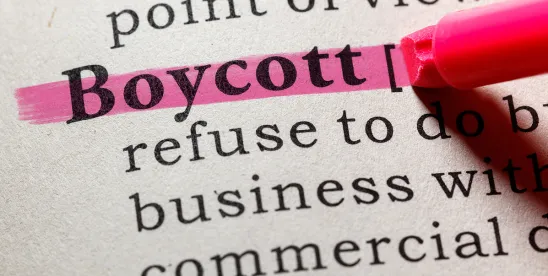We are publishing a four-part mini-series on anticorruption, export controls and economic sanctions, and antiboycott red flags. The first of these articles (found here) centers on anticorruption red flags; the second one (found here) addresses export controls and economic sanctions red flags. The precursor to today’s Red Flags article (found here), provides more details regarding U.S. antiboycott laws, reporting requirements, and penalties. And this article, which provides both sample red flags and some actual examples of boycott-related requests, completes the mini-series.
As covered in previous articles in our biweekly series, the U.S. government maintains prohibitions on participating in the Arab League boycott of Israel. Especially for companies that frequently deal with the Middle East, it is important to educate personnel regarding antiboycott red flags that might appear during business transactions. Some examples of red flags that would merit additional scrutiny include the following.
General Red Flags
- Contract language or document from a foreign business, referring to prohibitions regarding Israel.
- Contract language, form, or financial document from a foreign company that appears to discriminate against a specific race, religion, sex, or nationality.
- Documentation sent to your company from a foreign company, seeking information about business relationships with Israel.
- Documentation from a foreign company that seeks information about, or refers to, business relationships or activities with “blacklisted countries.”
- Contract language, shipping document, or checklist references to “The Arab League.”
- Subsidiary is requested to sign a document that includes a provision prohibiting Israel.
- Any references to the Arab League, the term “Zionist” or “Zionism,” or references to usage of the Jewish Star of David.
- Requests for information regarding the religion of senior management or directors of the company.
- Requests for information about whether the company operates in Israel or has business relationships with Israeli companies.
- Requests for information about whether the company relies on or uses Israeli technology.
Examples of Actual Reported Boycott Requests
The following are examples of boycott requests that have been reported to the U.S. Department of Commerce, as informed on the Bureau of Industry and Security website. These examples are illustrative and not exhaustive. Comparison of antiboycott requests with these provisions, as well as the examples provided in the U.S. Department of Commerce antiboycott regulations, should help clarify the legality of requests received by U.S. persons.
Contracts
- Bahrain (Prohibited Boycott Condition in a Contract): “The Seller shall not supply goods or materials which have been manufactured or processed in Israel nor shall the services of any Israeli organization be used in handling or transporting the goods or materials.”
- Libya (Prohibited Condition in a Contract): “Boycott Provisions: The Contractor shall observe and comply with all the provisions and decisions concerning the boycott to Israel or any other country the same is valid. The Contractor shall secure the respect of such boycott by any other party he might have subcontracted with him.”
- Qatar (Prohibited Condition in a Contract): “Certificate issued by the manufacturer or exporter stating that the goods are not of Israeli origin, have not been exported from Israel, and do not contain any Israeli materials.”
- Saudi Arabia (Prohibited Boycott Condition in a Contract): “Vendor shall comply with the Israel boycott laws in performing his contractual obligations.”
- Saudi Arabia (Prohibited Boycott Condition in a Contract): “The seller warrants that no supplier or manufacturer or any part of the product is precluded from doing business with Saudi Arabia under the terms of the Arab boycott regulations.”
Purchase Orders
- Bahrain (Prohibited Boycott Condition in a Purchase Order): “In the case of overseas suppliers, this order is placed subject to the suppliers being not on the Israel boycott list published by the central Arab League.”
- Qatar (Prohibited Boycott Condition in a Purchase Order): “Goods/equipment subject to Israeli Boycott terms, must not be quoted.”
- Saudi Arabia (Prohibited Boycott Condition in a Purchase Order): “Following statement should appear at foot of invoice: ‘We hereby certify that these goods are not of Israeli Origin nor do they contain materials of Israeli origin and they are manufactured by….’”
- Syria (Prohibited Condition in a Purchase Order): “A declaration that the goods contracted upon have no Israeli origin and that no Israeli raw materials is used in its producing manufacturing or preparing of the goods.”
Letters of Credit
- Bahrain (Prohibited Condition in a Letter of Credit): “Buyer shall in no way contravene the regulations issued by Bahrain Government and or Israel Boycott Office. Buyer shall not nominate a vessel blacklisted by the said office.”
- Kuwait (Prohibited Boycott Condition in Letter of Credit): “We hereby certify that the beneficiaries, manufacturers, exporters and transferees of this credit are neither blacklisted nor have any connection with Israel, and that the terms and conditions of this credit in no way contravenes the law pertaining to the boycott of Israel and the decisions issued by the Israel Boycott Office.”
- Libya (Prohibited Condition in a Letter of Credit): “Original commercial invoice signed and certified by the beneficiary that the goods supplied are not manufactured by either a company or one of its subsidiary branches who are blacklisted by the Arab boycott of Israel or in which Israeli capital is invested.”
- United Arab Emirates (Prohibited Boycott Condition in a Letter of Credit Application): “We certify that neither the beneficiaries nor the suppliers of goods and services are subject to boycott.”
- Qatar (Prohibited Boycott Condition in a Letter of Credit): “Under no circumstances may a bank listed in the Arab Israeli Boycott Black List be permitted to negotiate this Documentary Credit.”
Tenders
- Oman (Prohibited Condition in a Tender): “All goods to be supplied as a part of this order must comply with the Israel boycott rules stipulated by the Royal Oman Police.”
- Syria (Prohibited Condition in a Tender): “Offeror must not be included by the provisions of Arab Boycott of Israel.”
- Saudi Arabia (Prohibited Boycott Condition in a Tender): “The quotation should not include any material manufactured or exported by Boycotted companies as per the Kingdom of Saudi Arabia regulations.”
- United Arab Emirates (Prohibited Boycott Condition in a Tender): “Quotation should not include items manufactured by firms who are under Israeli Boycott list.”
Other
- Kuwait (Prohibited Boycott Condition in a Customs Document): “[The vessel entry document asks the ship’s captain to certify that,] no goods, dry cargo, or personal effects listed on the document of Israeli origin or manufactured by a blacklisted firm or company are to be landed as they will be subject to confiscation.”
- Syria (Prohibited Boycott Conditions (Requests for Information) in a Trademark Application Form): “Do you or any of your subsidiaries now or ever had a branch of main company factory or assembly plant in Israel? …. do you have or any of your subsidiaries now or ever had general agencies or offices in Israel for your middle eastern or international operations? …. what companies are you shareholders in their capital? State the name of each company and the percentage of share to their total capital — and the nationality of each one?”
- Yemen (Prohibited Boycott Condition in a Repair Order): “Invoices must be endorsed with a certificate of origin that goods are not of Israeli origin and do not contain any Israeli material and are not shipped from any Israeli port.”






 />i
/>i
